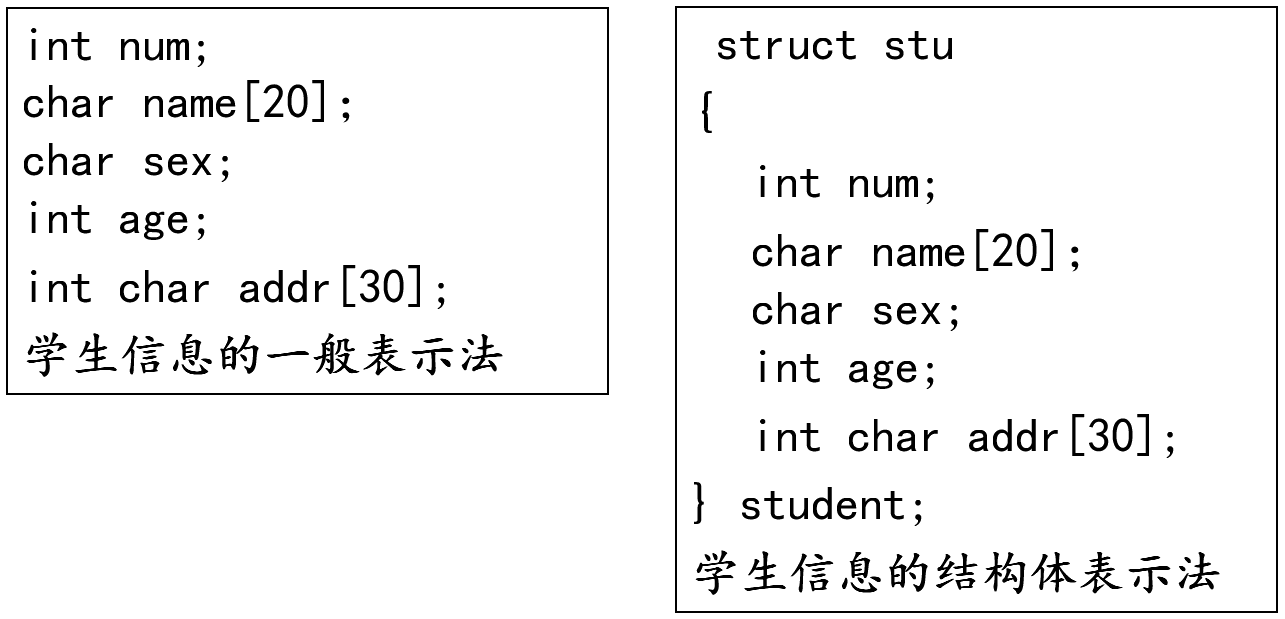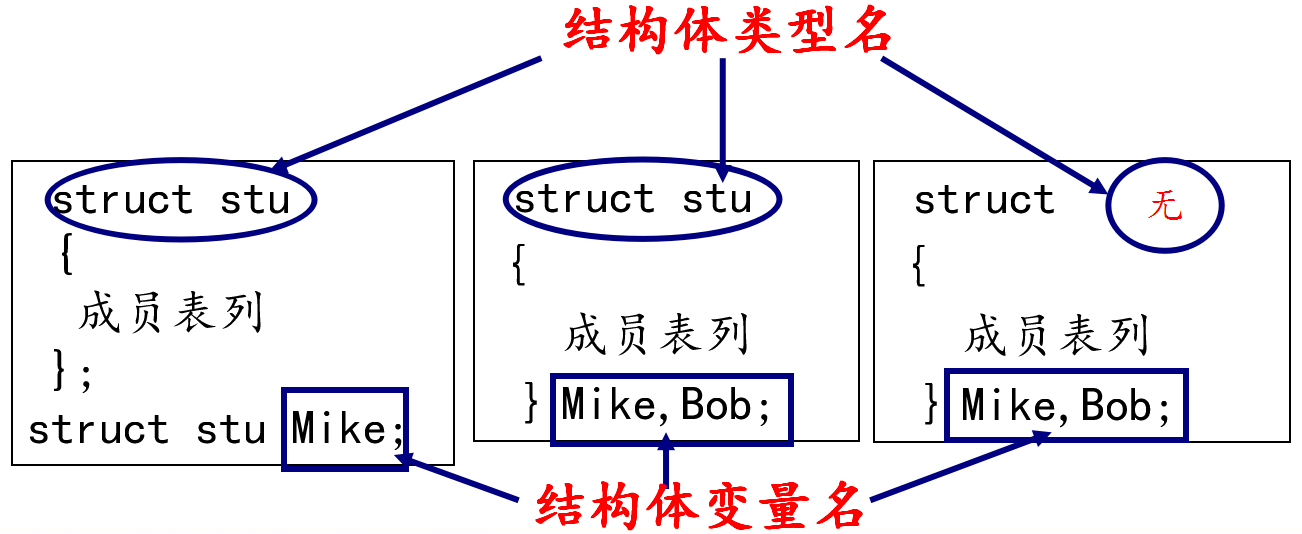C Language
- Chapter 9 Compound Types (Custom Types)
- 9.1 Structure
- 9.1.1 Overview
- Definition and Initialization of 9.1.2 Structural Variables
- 9.1.3 Use of Structural Members
- 9.1.4 Structural Array
- 9.1.5 sleeve structure
- 9.1.6 Structure Assignment
- 9.1.7 Structure and Pointer
- 9.1.8 Structures as Functional Parameters
- 9.2 Common Community (Commonwealth)
- 9.3 Enumerations
- 9.4 typedef
Chapter 9 Compound Types (Custom Types)
9.1 Structure
9.1.1 Overview
Array: Describes an ordered set of data of the same type used to process a large number of data operations of the same type.
Sometimes we need to combine different types of data into an organic whole, such as: a student has attributes such as school number/name/gender/age/address. Obviously, it is very complicated to define the above variables separately and the data is not easy to manage.
In C language, another type of structured data, structured body, is given.
Definition and Initialization of 9.1.2 Structural Variables
How structural variables are defined:
- Declare the structure type before defining the variable name
- Define variables while declaring types
- Direct Definition of Structural Type Variables (Untyped Names)

Structure type and structure variable relationship:
- Structural Type: Specifies a structure type that corresponds to a model, but does not contain specific data, nor does the system allocate actual memory units to it.
- Structural variables: The system allocates space according to the type of structure (internal member status).
//Definition of Structural Type struct stu { char name[50]; int age; }; //Define the type first, then the variable (commonly used) struct stu s1 = { "mike", 18 }; //Define types and variables at the same time struct stu2 { char name[50]; int age; }s2 = { "lily", 22 }; struct { char name[50]; int age; }s3 = { "yuri", 25 };
9.1.3 Use of Structural Members
#include<stdio.h> #include<string.h> //Definition of Structural Type struct stu { char name[50]; int age; }; int main() { struct stu s1; //If it is a normal variable, the structure members are manipulated by a point operator strcpy(s1.name, "abc"); s1.age = 18; printf("s1.name = %s, s1.age = %d\n", s1.name, s1.age); //If it is a pointer variable, manipulate the structure members by - >. strcpy((&s1)->name, "test"); (&s1)->age = 22; printf("(&s1)->name = %s, (&s1)->age = %d\n", (&s1)->name, (&s1)->age); return 0; }
9.1.4 Structural Array
#include <stdio.h> //Statistical achievement struct stu { int num; char name[20]; char sex; float score; }; int main() { //Define and initialize an array of structured bodies with five elements struct stu boy[5] = { { 101, "Li ping", 'M', 45 }, { 102, "Zhang ping", 'M', 62.5 }, { 103, "He fang", 'F', 92.5 }, { 104, "Cheng ling", 'F', 87 }, { 105, "Wang ming", 'M', 58 }}; int i = 0; int c = 0; float ave, s = 0; for (i = 0; i < 5; i++) { s += boy[i].score; //final scoring if (boy[i].score < 60) { c += 1; //Statistics of failures } } printf("s=%f\n", s);//Print total score ave = s / 5; //Calculate the average score printf("average=%f\ncount=%d\n\n", ave, c); //Print average score and number of failures for (i = 0; i < 5; i++) { printf(" name=%s, score=%f\n", boy[i].name, boy[i].score); // printf(" name=%s, score=%f\n", (boy+i)->name, (boy+i)->score); } return 0; }
9.1.5 sleeve structure
#include <stdio.h> struct person { char name[20]; char sex; }; struct stu { int id; struct person info; }; int main() { struct stu s[2] = { 1, "lily", 'F', 2, "yuri", 'M' }; int i = 0; for (i = 0; i < 2; i++) { printf("id = %d\tinfo.name=%s\tinfo.sex=%c\n", s[i].id, s[i].info.name, s[i].info.sex); } return 0; }
9.1.6 Structure Assignment
#include<stdio.h> #include<string.h> //Definition of Structural Type struct stu { char name[50]; int age; }; int main() { struct stu s1; //If it is a normal variable, the structure members are manipulated by a point operator strcpy(s1.name, "abc"); s1.age = 18; printf("s1.name = %s, s1.age = %d\n", s1.name, s1.age); //Two structural variables of the same type can be assigned to each other. //Copy the value of s1 member variable to the memory of s2 member variable //s1 and s2 are just the same values as the member variables. They are two variables that are not related. struct stu s2 = s1; //memcpy(&s2, &s1, sizeof(s1)); printf("s2.name = %s, s2.age = %d\n", s2.name, s2.age); return 0; }
9.1.7 Structure and Pointer
1. Points to variables of ordinary structures
#include<stdio.h> //Definition of Structural Type struct stu { char name[50]; int age; }; int main() { struct stu s1 = { "lily", 18 }; //If it is a pointer variable, manipulate the structure members by - >. struct stu *p = &s1; printf("p->name = %s, p->age=%d\n", p->name, p->age); printf("(*p).name = %s, (*p).age=%d\n", (*p).name, (*p).age); return 0; }
2. Reactor Area Structural Volume Variables
#include<stdio.h> #include <string.h> #include <stdlib.h> //Definition of Structural Type struct stu { char name[50]; int age; }; int main() { struct stu *p = NULL; p = (struct stu *)malloc(sizeof(struct stu)); //If it is a pointer variable, manipulate the structure members by - >. strcpy(p->name, "test"); p->age = 22; printf("p->name = %s, p->age=%d\n", p->name, p->age); printf("(*p).name = %s, (*p).age=%d\n", (*p).name, (*p).age); free(p); p = NULL; return 0; }
3. First-order pointer of structure sleeve
#include<stdio.h> #include <string.h> #include <stdlib.h> //Definition of Structural Type struct stu { char *name; //Primary pointer int age; }; int main() { struct stu *p = NULL; p = (struct stu *)malloc(sizeof(struct stu)); p->name = malloc(strlen("test") + 1); strcpy(p->name, "test"); p->age = 22; printf("p->name = %s, p->age=%d\n", p->name, p->age); printf("(*p).name = %s, (*p).age=%d\n", (*p).name, (*p).age); if (p->name != NULL) { free(p->name); p->name = NULL; } if (p != NULL) { free(p); p = NULL; } return 0; }
9.1.8 Structures as Functional Parameters
1. Ordinary variables of structure as function parameters
#include<stdio.h> #include <string.h> //Definition of Structural Type struct stu { char name[50]; int age; }; //Function parameters are general variables of structure void set_stu(struct stu tmp) { strcpy(tmp.name, "mike"); tmp.age = 18; printf("tmp.name = %s, tmp.age = %d\n", tmp.name, tmp.age); } int main() { struct stu s = { 0 }; set_stu(s); //pass by value printf("s.name = %s, s.age = %d\n", s.name, s.age); return 0; }
2. Structure pointer variables as function parameters
#include<stdio.h> #include <string.h> //Definition of Structural Type struct stu { char name[50]; int age; }; //Function parameter is pointer variable of structure void set_stu_pro(struct stu *tmp) { strcpy(tmp->name, "mike"); tmp->age = 18; } int main() { struct stu s = { 0 }; set_stu_pro(&s); //Address delivery printf("s.name = %s, s.age = %d\n", s.name, s.age); return 0; }
3. Structural array names as function parameters
#include<stdio.h> //Definition of Structural Type struct stu { char name[50]; int age; }; //void set_stu_pro(struct stu tmp[100], int n) //void set_stu_pro(struct stu tmp[], int n) void set_stu_pro(struct stu *tmp, int n) { int i = 0; for (i = 0; i < n; i++) { sprintf(tmp->name, "name%d%d%d", i, i, i); tmp->age = 20 + i; tmp++; } } int main() { struct stu s[3] = { 0 }; int i = 0; int n = sizeof(s) / sizeof(s[0]); set_stu_pro(s, n); //Array name passing for (i = 0; i < n; i++) { printf("%s, %d\n", s[i].name, s[i].age); } return 0; }
4.const Modified Pointer Parametric Variables of Structures
//Definition of Structural Type struct stu { char name[50]; int age; }; void fun1(struct stu * const p) { //p = NULL; //err p->age = 10; //ok } //void fun2(struct stu const* p) void fun2(const struct stu * p) { p = NULL; //ok //p->age = 10; //err } void fun3(const struct stu * const p) { //p = NULL; //err //p->age = 10; //err }
9.2 Common Community (Commonwealth)
- Joint union is a type of data that can store different types of data in the same storage space.
- The length of memory occupied by a consortium is equal to the length of its longest member, which is also called a common body.
- The same memory segment can be used to store several different types of members, but only one function at each instant.
- The member that plays a role in the common variable is the last member stored, and the value of the original member will be overwritten when a new member is stored.
- The address of the common variable and the address of its members are the same address.
#include <stdio.h> //Commons are also called consortia. union Test { unsigned char a; unsigned int b; unsigned short c; }; int main() { //Define Common Volume Variables union Test tmp; //1. The first address of all members is the same. printf("%p, %p, %p\n", &(tmp.a), &(tmp.b), &(tmp.c)); //2. The size of the shared body as the largest member type printf("%lu\n", sizeof(union Test)); //3. A member assignment affects another member //High on the left and low on the right //Lower address, higher address tmp.b = 0x44332211; printf("%x\n", tmp.a); //11 printf("%x\n", tmp.c); //2211 tmp.a = 0x00; printf("short: %x\n", tmp.c); //2200 printf("int: %x\n", tmp.b); //44332200 return 0; }
9.3 Enumerations
Enumeration: List the values of variables one by one. The values of variables are limited to the range of the values listed.
Enumeration type definition:
enum enumeration
{
Enumeration table
};
- All available values, also known as enumeration elements, should be listed in the enumeration value table.
- Enumeration values are constants and cannot be assigned to programs with assignment statements.
- The enumeration element itself is defined by the system as a numeric value representing the ordinal number from 0 to 0, 1, 2, and so on.
#include <stdio.h> enum weekday { sun = 2, mon, tue, wed, thu, fri, sat } ; enum bool { flase, true }; int main() { enum weekday a, b, c; a = sun; b = mon; c = tue; printf("%d,%d,%d\n", a, b, c); enum bool flag; flag = true; if (flag == 1) { printf("flag To be true\n"); } return 0; }
9.4 typedef
Typeedef is the key word of C language. Its function is to define a new name for a data type (basic type or custom data type), and it cannot create a new type.
- Unlike # define, typedef is limited to data types, not expressions or specific values.
- # define occurs in preprocessing, typedef occurs in compilation
#include <stdio.h> typedef int INT; typedef char BYTE; typedef BYTE T_BYTE; typedef unsigned char UBYTE; typedef struct type { UBYTE a; INT b; T_BYTE c; }TYPE, *PTYPE; int main() { TYPE t; t.a = 254; t.b = 10; t.c = 'c'; PTYPE p = &t; printf("%u, %d, %c\n", p->a, p->b, p->c); return 0; }